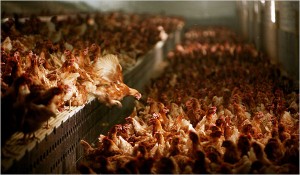Debunking Some of the Myths About Organic Food
Last week I wrote on the importance of understanding your food, based on knowing where your food comes from, and how to eat organically or locally in a bid to be environmentally friendly and health conscious. While making the move to organic foods products is a good move towards bettering the environment and sustainable agricultural practices, we still need to be knowledgeable consumers. We cannot blindly go to the supermarket and assume that everything labeled “Organic! Cage free! Grass-fed Beef!” is truly organic, was raised cage free, or was fed only grass. The truth about our food is that there is surprisingly little policing on how food is labeled and marketed. What official labeling of organic foods that does come from the United States Department of Agriculture (USDA) is also prone to problems. Furthermore, organic may not necessarily mean that it’s better for the environment and sustainable.
In the midst of this food revolution, many companies falsely use these labels to lure us as consumers, relying on the fact that we so often buy things on good faith. While we’d like to think that organic is always better, many industrial farms are beginning to capitalize on the public’s move towards organics and mass-producing organic products. One of the major reasons we cannot always trust organic labels in the supermarket is because of corporate takeover in the organic industry. Because corporations are recognizing that marketing foods as organic is good business, more and more people want to capitalize on this trendy food revolution. This however, means they’re gradually pushing out the original small organic farmers who farm with the environment in mind. Corporations often end up farming in ways that aren’t good for the land and often only meet the bare minimum requirements for organic certification. For example, organic farmers are typically supposed to give animals access to outdoors, but some farms confine the animals and meet the “outdoors” requirement just because there are screen windows in place. The USDA supports this practice, even though truly sustainable systems would allow animals to behave as if in nature. Another reason organic food isn’t sustainable in all situations is because it can still travel thousands of miles from these industrial farms before reaching the supermarket where you’ll buy the products. Like I mentioned last week, transportation of food products uses an immense amount of fossil fuels that pollute the air.
Sometimes, non-organic ingredients are also allowed in products that are labeled “organic” by USDA certification standards. This is very misleading for 38 different types of non-organic ingredients are currently allowed to be in food and still be labeled “organic”. This is because there are some foods where organic versions aren’t readily available. To clear up the confusion, here are some commonly used labels you should be aware of:
- “100% Organic” – contains only organically produced ingredients.
- “Certified Organic” – contains at least 95% organic ingredients
- “Made with Organic Ingredients” – contains between 70% to 95% organic ingredients
- “Contains Organic Ingredients” – contains less than 70% organic ingredients
I confess I was once this type of consumer that was duped by any product that had the word organic stuck to it. And I confess again, that I probably am still duped by these labels on occasion. When buying eggs, I always go for the cage free eggs. I’d bought so many cartons of this type of egg, simply assuming that “cage free” meant that the chickens lived a happy life on a pretty little farm, wandering about and pecking around as they pleased. Out of curiosity one day, I decided to look up some more information on what exactly warranted the moniker “cage free”. The information I found was very surprising. While these chickens aren’t crammed into cages, they are often still crammed into spaces much too small. Being outside is also not a requirement as windows are the only fresh air that is allotted to them. Cage free also doesn’t mean that it’s cruelty free either. The welfare of the chickens is still a prominent issue where their beaks are mutilated, molting is forced, and live chicks are ground into feed. The moral of the story is to be aware of the myths of organic products. Organic does not always mean sustainable, environmentally friendly, or animal friendly. To be aware of these marketing tactics you must thus be a knowledgeable consumer and work towards understanding your food.
only fresh air that is allotted to them. Cage free also doesn’t mean that it’s cruelty free either. The welfare of the chickens is still a prominent issue where their beaks are mutilated, molting is forced, and live chicks are ground into feed. The moral of the story is to be aware of the myths of organic products. Organic does not always mean sustainable, environmentally friendly, or animal friendly. To be aware of these marketing tactics you must thus be a knowledgeable consumer and work towards understanding your food.



1 pings